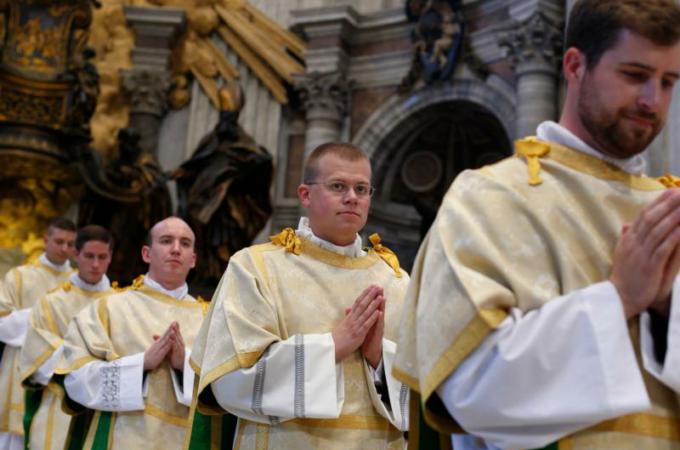Seminarians abroad: Study in Rome promotes cultural sensitivity
VATICAN CITY (CNS) -- Learning to walk in the shoes of a "foreigner" is not on the formal syllabus of the Pontifical North American College, but it happens.
The students at the U.S. bishops' seminary in Rome know they have a place to eat, sleep, pray and study, but they still experience some of the uprootedness that many of their future parishioners have experienced. And, like many Hispanic Catholics at home, the Hispanic seminarians in Rome preserve and share their religious and culinary traditions with their classmates.
For Alfredo Porras, a 26-year-old seminarian from the Diocese of Worcester, Massachusetts, learning to live in Rome is an all-too familiar experience. He immigrated to the United States with his family from Venezuela.
When he arrived in Rome, he said, he found himself repeating the phrase, "'This is my second time doing this' -- just because I moved to the States when I was 14 and I was placed in a new culture, new language, meeting new people, being away from family. Every seminarian here, in one way or another, gets to taste that same experience," he said.
Although he remembers the struggles of moving to a new country, Porras told Catholic News Service that being in Rome reminds him of "what people immigrating to the United States are going through."
Other migrants to Italy often go through years of bureaucratic maneuvering in the hopes of obtaining a visa. Ivan Torres, a seminarian from the Diocese of Las Cruces, New Mexico, said that reality opened his eyes to the fact that "we are very spoiled here" and have "people walking us through the process."
"I just couldn't imagine not having the help that we have and having to come over by yourself and be responsible for your children as well and wondering, 'Are they going to allow us in, are they going to give us these papers?'" the 24 year-old seminarian said.
Torres said he always enjoyed speaking and interacting with other people, something made easier by his ability to speak English and Spanish.
However, once in Italy, he soon experienced the difficulties of being unable to express himself or communicate with others.
"I didn't really understand that difficulty of not being able to express yourself. And that is something that is very real for immigrants and helps us to be a little bit more empathetic when trying to speak to people," he told CNS.
The 240 seminarians at the NAC are well aware of the demographic mix of the communities they are preparing to serve. Hispanic-Americans now make up approximately 30.4 million of the estimated 69.5 million Catholics in the United States, according to Georgetown University's Center for Applied Research in the Apostolate.
Shane Robert Hewson, a 26-year-old seminarian, told CNS that through his vocation, "God has called me to bridge this void" between Spanish- and English-speaking Catholic communities in the United States.
Whether the Mass is in English or Spanish, he said, "it is the same Eucharistic sacrifice. To have that unity, but in diversity, I hope I can bring that in the diocese."
Hewson, who hails from the Diocese of Tulsa, Oklahoma, said he hopes his encounters with some of the migrant people in Rome will help him understand better the lives of Catholic Hispanic immigrants back in the United States.
The experience, he said, has "been pressed upon my heart," and he hopes that it will help him recognize "they are coming from a world that is different and they are coming to a place they don't know and maybe it's a lot more difficult than they expected."
All three seminarians take part in activities and classes throughout that year that not only offer an opportunity for Spanish-speaking seminarians to bond, but also invites non-Spanish speakers to join in and learn different aspects of the Latin American culture and language.
"Once a semester we have a Hispanic dinner together. We get together and start cooking food," Porras told CNS.
In the student kitchen "a lot of times we make tacos; just the typical stuff you would expect that you can make here with the ingredients you have. So it's a nice way to get together," Hewson added.
Seminarians at the pontifical college also celebrate the feast of Our Lady of Guadalupe Dec. 12 with a Spanish Mass and a traditional Mexican meal cooked by the staff under the supervision of several Mexican-American seminarians.
The experience of living in a foreign country and in a seminary as diverse as the Pontifical North American College, serves as an "invaluable lesson in sensitivity and hospitality," says Father Peter Harman, rector of the college.
"I think -- for me personally -- you're a little bit humbled but you have an appreciation for what it takes to live in a place that's not second nature for you to speak and interact. I think that for all of our men, when they go home, they should have a greater cultural sensitivity because they themselves have been in a place where it's a little harder to get around," he told CNS.
Being forced to interact with people, even if you have not mastered their language, is also "a good priestly lesson," he said. "You eventually have to reach out and get out of your comfort zone."
- - -
Follow Arocho on Twitter: @arochoju.



















